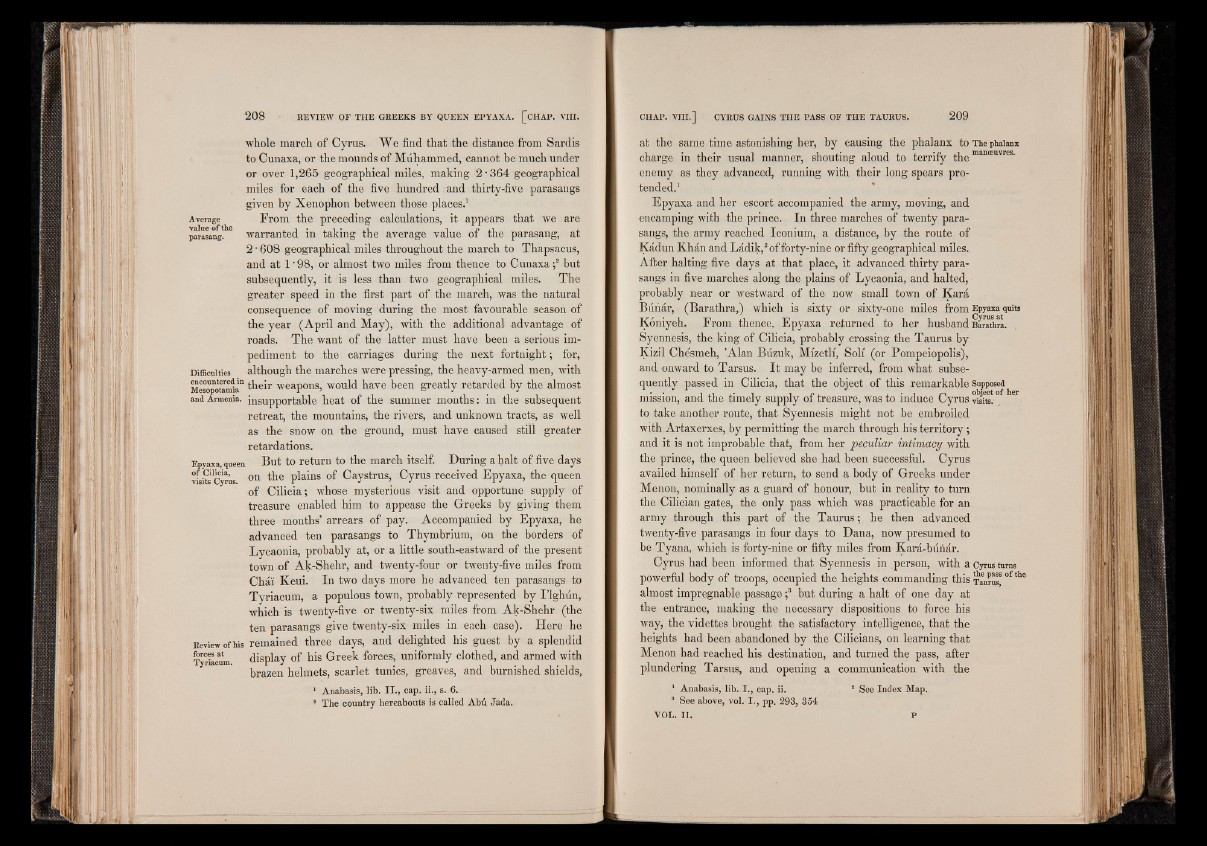
whole march of Cyrus. We find that the distance from Sardis
to Cunaxa, or the mojunds of Muhammed, cannot be much under
or over 1,265 geographical miles, making 2 -364 geographical
miles for each of the five hundred and thirty-five parasangs
given by Xenophon between those places.1
Average From the preceding calculations, it appears that we are
parasang. e warranted in taking the average value of the parasang, at
2 • 608 geographical miles throughout the march to Thapsacus,
and at 1 198, or almost two miles from thence to Cunaxa ;8 but
subsequently, it is less than two geographical miles. The
greater speed in the first part of the march, was the natural
consequence of moving during the most favourable season of
the year (April and May), with the additional advantage of
roads. The want of the latter must have been a serious impediment
to the carriages during the next fortnight; for,
Difficnities although the marches were pressing, the heavy-armed men, with
Mesopotamia11 their weapons, would have been greatly retarded by the almost
and Armenia, insupportable heat of the summer months: in the subsequent
retreat, the mountains, the rivers, and unknown tracts, as well
as the snow on the ground, must have caused still greater
retardations.
Epyaxa, queen But to return to the march itself. During a halt of five days
°Lus Cyrus 011 the plains of Caystrus, Cyrus received Epyaxa, the queen
of Cilicia; whose mysterious visit and opportune supply of
treasure enabled him to appease the Greeks by giving them
three months’ arrears of pay. Accompanied by Epyaxa, he
advanced ten parasangs to Thymbrium, on the borders of
Lycaonia, probably at, or a little south-eastward of the present
town of Ak-Shehr, and twenty-four or twenty-five miles from
Chai Keui. In two days more he advanced ten parasangs to
Tyriacum, a populous town, probably represented by I ’lghun,
which is twenty-five or twenty-six miles from Ak-Shehr (the
ten parasangs give twenty-six miles in each case). Here he
Review of his remained three days, and delighted his guest by a splendid
Tyriacum display of his Greek forces, uniformly clothed, and armed with
brazen helmets, scarlet tunics, greaves, and burnished shields,
1 Anabasis, lib. I I ., cap. ii., s. 6.
s The country hereabouts is called Abu Jada.
at the same time astonishing her, by causing the phalanx to The phalanx
charge in their usual manner, shouting aloud to terrify themaooeUTres-
enemy as they advanced, running with their long spears pro-
tended.1
Epyaxa and her escort accompanied the army, moving, and
encamping with the prince. In three marches of twenty parasangs,
the army reached Iconium, a distance, by the route of
Kadun Khan and Ladik,2of forty-nine or fifty geographical miles.
After halting five days at that place, it advanced thirty parasangs
in five marches along the plains of Lycaonia, and halted,
probably near or westward of the now small town of Kara
Bunar, (Barathra,) which is sixty or sixty-one miles from Epyaxa quits
Koniyeh. From thence, Epyaxa returned to her husband Barathra.
Syennesis, the king of Cilicia, probably crossing the Taurus by
Kizil Chesmeh, ’Alan Buzuk, Mizetli, Soli (or Pompeiopolis),
and onward to Tarsus. It may be inferred, from what subsequently
passed in Cilicia, that the object of this remarkable Supposed
mission, and the timely supply of treasure, was to induce Cyrus ° er
to take another route, that Syennesis might not be embroiled
with Artaxerxes, by permitting the march through his territory;
and it is not improbable that, from her peculiar intimacy with
the prince, the queen believed she had been successful. Cyrus
availed himself of her return, to send a body of Greeks under
Menon, nominally as a guard of honour, but in reality to turn
the Cilician gates, the only pass which was practicable for an
army through this part of the Taurus; he then advanced
twenty-five parasangs in four days to Dana, now presumed to
be Tyana, which is forty-nine or fifty miles from Kara-bunar.
Cyrus had been informed that Syennesis in person, with a Cyrus turns
powerful body of troops, occupied the heights commanding this Taurus^ °f the
almost impregnable passage ;3 but during a halt of one day at
the entrance, making the necessary dispositions to force his
way, the videttes brought the satisfactory intelligence, that the
heights had been abandoned by the Cilicians, on learning that
Menon had reached his destination, and turned the pass, after
plundering Tarsus, and opening a communication with the
1 Anabasis, lib. I ., cap. ii. ‘ See Index Map.
s See above, vol. I ., pp. 293, 354
VOL. I I . P